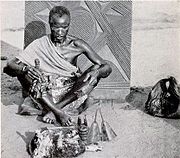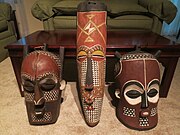Portal:Traditional African religions
Introduction The beliefs and practices of African people are highly diverse, and include various ethnic religions. Generally, these traditions are oral rather than scriptural and are passed down from one generation to another through folk tales, songs, and festivals, and include beliefs in spirits and higher and lower gods, sometimes including a supreme being, as well as the veneration of the dead, and use of magic and traditional African medicine. Most religions can be described as animistic with various polytheistic and pantheistic aspects. The role of humanity is generally seen as one of harmonizing nature with the supernatural. Unlike Abrahamic religions, African traditional religions are not idealisations, and they seek to come to terms with reality as it is. They generally seek to explain the reality of personal experience by spiritual forces which underpin orderly group life, contrasted by those that threaten it. (Full article...) Selected article'Divination (from Latin divinare "to foresee, to be inspired by a god", related to divinus, divine) is the attempt to gain insight into a question or situation by way of an occultic, standardized process or ritual. Used in various forms throughout history, diviners ascertain their interpretations of how a querent should proceed by reading signs, events, or omens, or through alleged contact with a supernatural agency. Divination can be seen as a systematic method with which to organize what appear to be disjointed, random facets of existence such that they provide insight into a problem at hand. If a distinction is to be made between divination and fortune-telling, divination has a more formal or ritualistic element and often contains a more social character, usually in a religious context, as seen in traditional African medicine. Fortune-telling, on the other hand, is a more everyday practice for personal purposes. Particular divination methods vary by culture Selected imagesFestivalsThere are several religious festivals found in the various Traditional African religions. Some of these are listed below next to their corresponding religion :
Selected biography
Soumaoro Kanté (var.: Sumanguru Kanté) was a 13th-century king of the Sosso people. Seizing Koumbi Saleh, the capital of the recently defunct Ghana Empire, Soumaoro Kanté proceeded to conquer several neighboring states, including the Mandinka people in what is now Mali. However, the Mandinka prince Sundiata Keita built a coalition of smaller kingdoms to oppose him at the Battle of Kirina (c. 1235), defeating the Sosso and leaving Sundiata's new Mali Empire dominant in the region.
Soumaoro Kanté is portrayed as a villainous sorcerer-king in the national epic of Mali, the Epic of Sundiata. Selected quote
Source: Diouf, Babacar Sédikh, Le Sérère, Paganism Polythéiste ou Religion Monothéiste [in] Camara, Fatou Kiné (PhD) & Seck, Abdourahmane (PhD), "Secularity and Freedom of Religion in Senegal: Between a Constitutional Rock and a Hard Reality", p 860-61 (PDF - p. 2-3) [1]
Did you know
Related portalsTopicsFor more Traditional African religion topics, see Category:Traditional African religions.
CategoriesWikiProjectsThings you can doAssociated WikimediaThe following Wikimedia Foundation sister projects provide more on this subject:
Discover Wikipedia using portals |





































